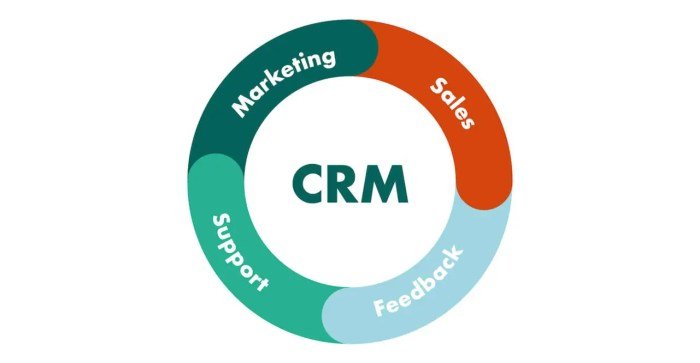In today’s competitive business landscape, organizations are seeking tailored solutions to meet their unique industry-specific challenges. Customer relationship management (CRM) software has emerged as a powerful tool, offering industry-specific features that address these challenges and empower businesses to drive growth.
This comprehensive guide explores the benefits, selection criteria, and implementation best practices of industry-specific CRM software. Discover how these solutions can transform your business operations, streamline customer interactions, and unlock new revenue streams.
Industry-Specific CRM Features
Customer Relationship Management (CRM) software tailored to specific industries empowers businesses to cater to their unique challenges and optimize business processes. These industry-specific CRMs incorporate features designed to address industry-specific needs, enhancing efficiency and driving growth.
The following table presents a comprehensive overview of common CRM features tailored to various industries, highlighting their relevance and impact:
Healthcare Industry
| Feature | Description | Benefits |
|---|---|---|
| Patient Management | Centralized patient records, appointment scheduling, and medical history tracking | Improved patient care, reduced errors, and enhanced communication |
| Insurance Billing | Automated insurance claim processing and billing management | Streamlined billing processes, reduced errors, and improved cash flow |
| Clinical Decision Support | Integrated clinical guidelines, drug interactions, and treatment plans | Enhanced patient safety, improved treatment outcomes, and reduced costs |
| Telemedicine Integration | Virtual consultations, remote patient monitoring, and secure messaging | Increased patient access, improved convenience, and reduced healthcare costs |
Benefits of Industry-Specific CRM
Industry-specific CRM software provides numerous advantages tailored to the unique needs and challenges of various industries. These specialized solutions enhance customer interactions, streamline operations, and drive revenue growth.
Improved Customer Interactions
Industry-specific CRMs enable businesses to understand their customers’ specific needs and preferences. By capturing industry-specific data, these systems provide a comprehensive view of customer interactions, allowing businesses to:
- Personalize marketing campaigns
- Provide tailored customer service
- Build stronger customer relationships
Streamlined Operations
Industry-specific CRMs automate industry-specific processes, eliminating manual tasks and reducing errors. This streamlining leads to:
- Increased efficiency
- Improved data accuracy
- Reduced operating costs
Revenue Growth
By improving customer interactions and streamlining operations, industry-specific CRMs contribute to revenue growth. They enable businesses to:
- Increase sales conversions
- Improve customer retention
- Identify new revenue opportunities
Real-Life Examples
Numerous businesses have experienced significant benefits from implementing industry-specific CRMs. For example:
- A healthcare provider used an industry-specific CRM to improve patient care and reduce costs.
- A manufacturing company used an industry-specific CRM to streamline production processes and increase efficiency.
- A financial services firm used an industry-specific CRM to enhance customer service and drive revenue growth.
Selection Criteria for Industry-Specific CRM

Selecting the right industry-specific CRM requires careful consideration of several key factors. By evaluating these factors and prioritizing them based on business needs, organizations can make informed decisions that align with their specific requirements.
Industry Fit
Industry fit is crucial as it ensures the CRM caters to the unique processes, terminology, and data requirements of the specific industry. Consider whether the CRM provides industry-specific templates, pre-built workflows, and integrations with industry-standard tools.
Scalability
CRM should be able to grow with the business. Evaluate the scalability of the CRM to handle increasing data volumes, users, and complexity. Consider whether the CRM supports flexible customization and integration options to adapt to changing business needs.
Integration Capabilities
Integration capabilities are essential for connecting the CRM with other business systems. Consider the CRM’s ability to integrate with marketing automation tools, ERP systems, and industry-specific software. Seamless integration streamlines data flow and improves efficiency.
Vendor Support
Vendor support is critical for ongoing maintenance, updates, and troubleshooting. Evaluate the vendor’s reputation, customer support track record, and resources available for industry-specific guidance. Strong vendor support ensures the CRM remains optimized and aligned with business objectives.
Implementation Best Practices for Industry-Specific CRM
Effective implementation of an industry-specific CRM requires a well-defined plan and meticulous execution. Here’s a step-by-step guide to ensure a smooth and successful implementation process:
Data Migration
Data migration is crucial for transferring existing customer information and historical data from legacy systems or spreadsheets into the new CRM. This process should be meticulously planned and executed to maintain data integrity and minimize disruptions.
- Assess the existing data sources and identify data fields that need to be migrated.
- Create a data mapping plan to match fields from the old system to the new CRM.
- Perform data cleansing and deduplication to ensure data accuracy and eliminate duplicate entries.
- Test the data migration process thoroughly before executing it on the live system.
Final Conclusion
Implementing industry-specific CRM software is a strategic investment that can revolutionize your business operations. By carefully considering the selection criteria, following best practices, and leveraging tailored features, you can harness the power of CRM to achieve exceptional customer experiences, optimize processes, and drive sustainable growth. Embrace the transformative potential of industry-specific CRM and unlock the competitive advantage it offers.
FAQs
What are the key benefits of using industry-specific CRM software?
Industry-specific CRM software offers numerous benefits, including improved customer interactions, streamlined operations, increased revenue growth, and enhanced industry-specific functionality.
How do I select the right industry-specific CRM for my business?
To select the right industry-specific CRM, consider factors such as industry fit, scalability, integration capabilities, vendor support, and alignment with your business objectives.
What are the best practices for implementing industry-specific CRM software?
Best practices for implementing industry-specific CRM include data migration, user training, ongoing optimization, and continuous evaluation to ensure alignment with business needs.